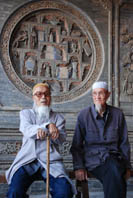|
Ma lives in Datanchuan Village in Wuzhong’s Tongxin County, and all the villagers are Hui. His 16-year-old son, Ma Li, is one of the children in his junior school class who passed the entrance examination to Liupanshan High School. The teacher at the registration table told our reporter that Ma Li only needed to pay RMB 600 for textbooks, uniforms and insurance to enter the school.
Ma Li said that among the more than 60 students in his class, less than 20 passed the entrance exam to Liupanshan High School, while some of the others entered Yucai Middle School. “It requires a higher score to enter Liupanshan,” he said proudly. His elder brother and sister were not as lucky, because the two schools were only established in 2003 and 2005, respectively.
According to Jin Cunyu, headmaster of Liupanshan High School, the school allows Hui children in Ningxia’s underdeveloped areas to enter with a lower score on their entrance exams. This helps balance the opportunities for an education for students from different regions.
There are more than 3,000 students at the school, with 1,200 Hui students coming from nine southern cities and counties. Ma Yan, from Yanchi County in Wuzhong City, is in the third grade at the school. She is the only Hui among the six girls in her dormitory. She says that she feels comfortable at school because all the dining halls provide Halal foods, and she gets along well with her Han classmates.
“I hope that I can study at a university in Beijing,” says Ma. It has been her fondest wish ever since she left her hometown to study at the high school in Yinchuan.
Moreover, the regional government has allocated over RMB 300 million for a project to standardize the construction of around 100 Hui middle and primary schools. The project was completed in September 2008, and thanks to the implementation of nine-year compulsory education almost all the children in the southern mountainous areas have the opportunity to go to school.
The Increasing Influence of Islam
 |
|
Two elders waiting ourside a mosque to attend a prayer. |
Wang Wanqiang, an elderly Hui, attends prayers in Yinchuan Xihuan Grand Mosque five times a day. Although he is 75 years old, he is full of energy and vitality. It takes him a little more than 10 minutes to walk from his home to the mosque. He says that his sons do not attend regular prayers due to their busy work schedules. But, like Wang, there are hundreds of Hui people who attend prayers every day.
Ma Zhanwen is an imam at the mosque in charge of religion affairs. He has been an imam for years despite his young age of 35. He says that the Xihuan Grand Mosque was renovated in 2003, and that it serves 2,000 to 3,000 Muslims living in the neighborhood.
Since 2002, the regional government has started to organize groups to Mecca for the annual pilgrimage, or Hajji. Ma Zhanwen had the honor to be team leader of the first group in 2002. He says that everyone on the organized pilgrimage has to shoulder a traveling expense of around RMB 30,000, so the members are mostly well-off. In addition, one must be fit to travel the long distance.
According to Hei Fuli, executive vice president of the Ningxia Islamic Association, the Chinese government resumed organizing group trips to Mecca in 1985. The size of the annual group to Mecca increased from 15 members in 1988 to over 1,600 in 2007. Until now, some 8,000 Muslims have joined the groups to Mecca. Since 2007, the groups have been able to charter planes and fly directly from Yinchuan to Mecca, avoiding having to transfer in Beijing or Lanzhou.
There is a beautiful 600-year-old mosque in Wuzhong’s Tongxin County. It still serves as a good place for locals to attend prayers. Usually, there are less than 100 people in the mosque, but during the Festival of Fast-breaking, 1,000 to 2,000 people gather here. Of Tongxin County’s population of 360,000, 86 percent are Hui. Therefore Tongxin County is one of those areas where Muslim traditions are best preserved. The government here has set up the Ethnic Minority Development Fund to help the local Hui people that still live in poverty either to relocate to a better living environment or to develop a stable livelihood.
“Few young people attend prayers now. Those attending are mostly the elderly,” says Ma Zhanwen. “For years, Islamic laws have been passed down from father to son, but due to hectic modern work and study schedules, many young Muslims have no time to fully follow Islamic laws.” Ma expresses the hope that more and more people will begin attending regular prayers. However, Islam itself encourages people to work hard on their studies and in pursuing their careers. He just hopes that those young Muslims will “come back to the mosque when they are old.” | 